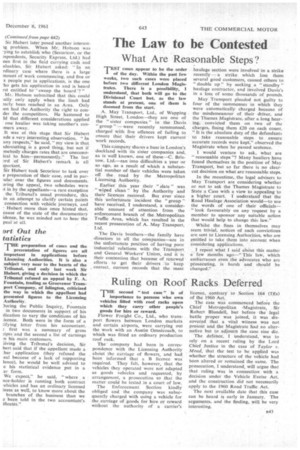Ruling on Roof Racks Deferred
Page 77

If you've noticed an error in this article please click here to report it so we can fix it.
THE second test case" is of
1 importance to persons who own vehicles fitted with roof racks upon which they carry other people's goods for hire or reward.
Flower Freight Co., Ltd., who transport flowers between London markets and certain airports, were carrying out the work with an Austin Omnicoach, to which was fitted an ordinary production roof rack.
The company had been in correspondence with the Licensing Authority about the carriage of flowers, and had been informed that a B licence was required. They felt, however, that the vehicles they operated were not adapted as goods vehicles and requested, by arrangement, a prosecution so that the matter could be tested in a court of law.
The Enforcement Section kindly obliged and the company was subsequently charged with using a vehicle for the carriage of goods for hire or reward without the authority of a carrier's licence, contrary to Section 164 (1)(a) of the 1960 Act.
The case was commenced before the Chief Metropolitan Magistrate, Sir Robert Blundell, but before the legal battle proper was joined, it was discovered that a vital witness was not present and the Magistrate had no alternative but to adjourn the case sine die.
The defence, I understand, was to rely on a recent ruling by the Lord Chief Justice in the case of Taylor v. Mead, that the test to be applied was whether the structure of the vehicle had been altered or remained the same. The prosecution, I understand, will argue that that ruling was in connection with a decision under the Vehicle Excise Act, and the construction did not necessarily apply to the 1960 Road Traffic Act.
The next available date that this case can be heard is early in January. The arguments, and the finding, will be very interesting.




































































































































